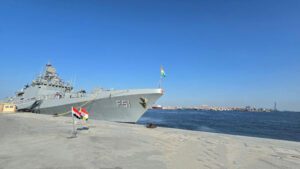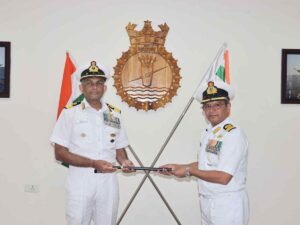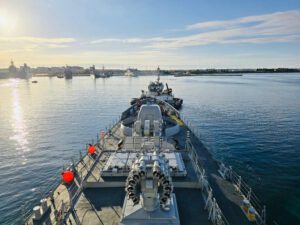INS Trikand Strengthens Naval Ties with Egypt During Safaga Port Visit
The Indian Navy’s frontline frigate, INS Trikand, has made a significant port call at Safaga, Egypt, marking another milestone in India’s ongoing efforts to deepen maritime cooperation with friendly nations. The visit is part of the ship’s operational deployment to the Red Sea and the North Arabian Sea, regions that are vital for India’s strategic and trade interests.
A Symbol of India’s Blue-Water Aspirations
INS Trikand, part of the Western Fleet under the Western Naval Command, represents the cutting edge of India’s naval capabilities. The Talwar-class stealth frigate is equipped with advanced weaponry, sensors, and electronic warfare systems, capable of undertaking a wide range of missions—from anti-piracy and maritime security to escort and deterrence operations. Its deployment in the Red Sea region underscores India’s intent to maintain a strong and responsive naval presence in critical sea lanes that support global trade.
The visit to Safaga also serves as a reflection of India’s commitment to its maritime vision—ensuring peace, stability, and security across the Indian Ocean Region (IOR). By maintaining regular deployments in international waters, the Indian Navy continues to act as a net security provider and a reliable partner to nations sharing the same goal of safe and open seas.
Strengthening India-Egypt Maritime Partnership
During its stay in Egypt, INS Trikand’s crew engaged in a range of professional interactions with personnel from the Egyptian Navy. These included cross-deck visits, operational discussions, and exchanges focused on best practices in navigation, damage control, and maritime safety. Such interactions not only build trust but also pave the way for greater interoperability between the two navies.

The port call comes at a time when India and Egypt are exploring new avenues of defense and economic cooperation. Earlier this year, both countries reaffirmed their commitment to enhance collaboration in defense production, training, and joint exercises. The Indian Navy’s visit reinforces this partnership, signaling New Delhi’s intention to expand its strategic footprint in West Asia and North Africa.
For Egypt, which controls the Suez Canal—a lifeline of global commerce—the engagement highlights shared concerns over maritime security, anti-piracy operations, and freedom of navigation. Collaborative efforts between the two nations help safeguard trade routes that carry a significant portion of India’s oil and merchandise exports.
Cultural Diplomacy on Deck
Beyond military cooperation, INS Trikand’s visit also served as a cultural bridge. The ship hosted an “Open Day” event for Egyptian naval officers, diplomats, and local dignitaries, offering them a glimpse of Indian naval traditions and technological advancements. The crew participated in community activities and outreach programs, reflecting the Navy’s softer side—one rooted in goodwill and friendship.
These cultural exchanges play an important role in promoting India’s image abroad. They create people-to-people connections that complement formal defense diplomacy, helping both nations foster mutual understanding beyond strategic imperatives.
Charting a Course Toward Regional Stability
As global maritime dynamics evolve, the Red Sea and adjoining waters have become increasingly important for ensuring global energy security and combating transnational threats. India’s proactive naval engagement with Egypt aligns with its broader Indo-Pacific vision—promoting cooperation, ensuring the rule of law at sea, and maintaining freedom of navigation.

The visit of INS Trikand to Safaga is not just a ceremonial gesture but a demonstration of India’s readiness to engage, collaborate, and contribute to a peaceful maritime environment. It highlights how India’s navy, while rooted in national security interests, also serves as an instrument of diplomacy and international cooperation.
A Voyage of Friendship and Purpose
As INS Trikand sails onward from Egypt, it carries with it the spirit of partnership and shared responsibility that defines India’s maritime outreach. The deployment strengthens not only naval ties but also the broader vision of a stable, secure, and cooperative maritime neighborhood. In the words of a senior naval officer onboard, the visit “symbolizes India’s friendship across the seas and its enduring commitment to peace and partnership.”
With every such voyage, India reaffirms its role as a responsible maritime power—one that seeks not dominance, but dialogue and collaboration on the waves that connect nations.
Also read: https://channel6network.com/bihar-deputy-cm-formula-tejashwi-3-deputy-plan/

